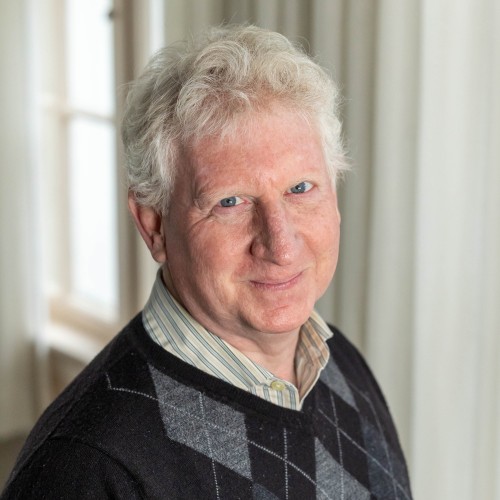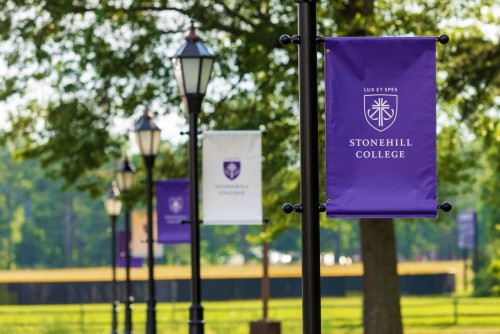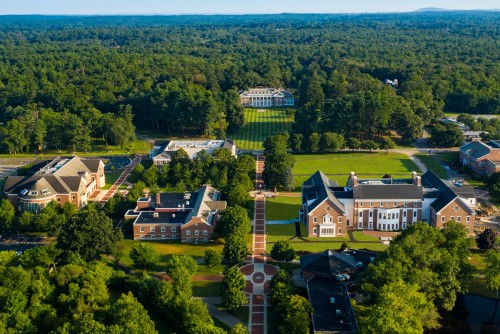Our Computer Science Grads are Hardwired for Adaptability
With an emphasis on fundamentals, Stonehill’s program empowers students to thrive no matter how the field evolves.
Ask Professor Shai Simonson what stands out about Stonehill’s computer science program and you’re unlikely to hear about the latest coding language or the trends in artificial intelligence. Instead, he says, it comes down to something more timeless: mathematics principles.
“We offer a fundamental computer science education, scaffolded by the essentials of discrete math, probability, statistics and other core sciences,” he explains. “As the latest tools and technologies come and go, employers most want to know that you can apply basic principles to solve problems — and our students can.”
Touting the program’s rigorous curriculum — uniquely comprehensive for a college of Stonehill’s size — Simonson explains that while they set a high bar for student performance, supportive professors are behind students every step of the way. “Students at every level are given the tools they need to succeed here,” he says. “If they make it halfway on a given challenge, we lift them up the rest of the way.”
Prioritizing Problem-Solving
Computer science major Jeremiah Peñaflorida ’20 credits the close faculty support for his confidence in both tackling the exhaustive interview process at American Express and for the success he has experienced as an AmEx software engineer. He is currently based in Phoenix, where he helps lead the development of a servicing application used by tens of thousands of colleagues.
“The fact that I could easily get time with my professors made it feel like I was learning right along with them, rather than from a screen or from teaching assistants, as [would be the case] in a larger research university,” he explains.
As a result, Peñaflorida says he was fully prepared for his lengthy technical interview, commonly used by companies to fill technology roles, which typically ask candidates to demonstrate their ability to work with data, algorithms and programming languages. “The only way to prepare is to understand how to solve problems,” he explains. “That’s what Stonehill teaches you to do.”
Lorelie Murphy ’24 credits Stonehill’s “humanities mentality” for her success in roles at the Bedford, Massachusetts-based information security company Idemia.
Endless Applications for Essential Skills
Problem-solving skills are equally essential as graduates move through the roles that shape their post-college careers. Matt Grant ’17, a software engineer at Peloton Interactive in Newport, Rhode Island, has held three jobs since graduating — each completely unique. “Nothing really translated from one role to the next; the skills you gain are generally company-specific,” Grant explains. “What prepared me was learning at Stonehill to think like a computer scientist.”
Simonson credits this kind of thinking for being responsible for the program’s high placement rates in internships and post-graduation roles across a wide range of technology-related roles in a variety of industries. “Given the skills of our students and the strength of our Stonehill network, there’s no shortage of opportunities,” he explains. “Employers know that our students prove themselves with the adaptable nature of their knowledge and capabilities.” Those strengths extend beyond the elements of computer science to equally essential “intangibles”: leadership, teamwork and communication.
Lorelie Murphy ’24 credits Stonehill’s “humanities mentality” for her success in roles at the Bedford, Massachusetts-based information security company Idemia, where she progressed from intern to site lead, and now an accepted full-time role after graduation. “When they were looking for someone to oversee the company’s interns, people turned to me,” she explains. “Stonehill pushed me to become a leader.”
Learning to Learn — and Teach
The Stonehill computer science experience culminates with a capstone project, weaving together all the students have learned as they work in partnership on a real-world project. Members of the Stonehill community and beyond pitch project ideas to the students, who then choose one on which to work. They apply technology to solve the problem of the “client” and then work in groups to develop a finished product.
Project management skills tend to emerge from that capstone experience, further preparing future technology professionals such as Eric Czarny ’07, an engineering manager at Meta in New York City. In his role, Czarny keeps a team of 12 engineers aligned in their priorities and progress. “A lot of what I do involves sharing ideas,” he explains. “At Stonehill, I learned both how to learn effectively and how to communicate my knowledge to others.”
Tiziana Hernandez ’24 is taking that emphasis on learning and communication to a planned career in academia to help future generations advance in STEM careers. “One of my hardest courses was discrete math; I was always in Shai’s (Simonson’s) office getting extra help,” she explains. “Now, I’m the teaching assistant for that course. I’ve come full circle.”
We offer a fundamental computer science education, scaffolded by the essentials of discrete math, probability, statistics and other core sciences. As the latest tools and technologies come and go, employers most want to know that you can apply basic principles to solve problems — and our students can.
-
Request Information
Sign up now to be added to our mailing list, and we will show you how Stonehill could become part of your story.
-
Visit Opportunities
Our visit programs will help give you a better understanding of how Stonehill’s expansive leadership and experiential learning opportunities equip students for success in a rapidly evolving and globally competitive world.
-
Apply for Admission
Stonehill College provides an exceptional learning experience for both undergraduate and graduate students. We invite you to review the process, requirements and application deadlines for our entry options.



